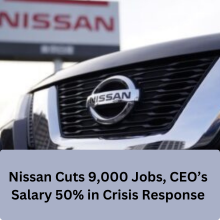
Nissan, the global automotive giant, is grappling with a severe financial crisis. As the company revealed its first-half results for Fiscal Year 2024, the numbers were far from promising. Decreased revenue, plummeting global sales, and a minuscule 0.5% operating profit margin have left Nissan’s leadership with little choice but to make drastic decisions. The company has announced plans to cut 9,000 jobs globally and slash the CEO’s salary by 50%. These moves are part of a larger plan aimed at restructuring and streamlining operations to ensure long-term growth and stability. But, what does this mean for the future of Nissan?
Nissan’s Financial Struggles
FY24 First-Half Results: Decreased Revenue, Sales, and Profits
Nissan’s performance during the first half of Fiscal Year 2024 paints a concerning picture. The company’s consolidated net revenue and global sales volumes have seen significant declines compared to the same period in 2023. The most alarming statistic is the company’s operating profit margin, which has plummeted to a mere 0.5%. This marks a stark contrast to the profitability Nissan had enjoyed in previous years. The decrease in sales and revenue is reflective of the company’s struggles to stay competitive in a saturated global market.
Decline in Global Sales Volumes
The company reported a sharp decline in global sales volumes, dropping to just 1.6 million units for the first half of FY24. This year-on-year decrease in sales is significant, considering the competitive nature of the automotive industry. The drop can be attributed to a combination of external factors, including economic instability, supply chain disruptions, and rising manufacturing costs.
Analyzing Nissan’s Operating Profit Margin of 0.5%
A 0.5% operating profit margin is not sustainable in the long term. High costs of production, coupled with lower sales, have made it increasingly difficult for Nissan to maintain profitability. This margin is a warning sign that the company’s current operations are not yielding the returns needed to stay competitive or reinvest in future growth.
The Global Economic Impact
External Challenges: Rising Material Costs, Inflation, and Supply Chain Issues
The global economic climate is one of the key reasons behind Nissan’s struggles. Rising material costs, coupled with inflation, have made it more expensive to produce vehicles. Additionally, ongoing supply chain disruptions—exacerbated by the COVID-19 pandemic and geopolitical tensions—have delayed production and increased operational costs. The automotive industry, in general, has been hit hard by these external challenges, and Nissan is no exception.
Why Nissan is Cutting 9,000 Jobs
Explanation of Job Cuts as Part of a Broader Cost-Reduction Plan
To stay afloat and return to profitability, Nissan has made the difficult decision to cut 9,000 jobs worldwide. This includes manufacturing, administrative, and support roles. While these job cuts are painful, they are part of a larger strategy aimed at slashing operational costs. Nissan aims to streamline its workforce and become leaner, which will allow the company to adapt quickly to market changes and improve efficiency.
A Breakdown of Affected Regions and Departments
While the layoffs will impact various regions globally, Nissan has been particularly focused on optimizing its production capacity in regions where it has been underperforming. The largest reductions are expected in areas where sales have been weak, such as the United States and parts of Europe.
Long-Term Benefits vs. Immediate Pain
Although cutting jobs is a painful process, Nissan believes that these measures will ultimately benefit the company in the long term. By reducing labor costs, the company can focus on reinvesting in key areas like research and development, improving product competitiveness, and enhancing efficiency.
CEO Pay Cut – A Symbolic Gesture?
Nissan’s CEO Takes a 50% Pay Cut
In an unprecedented move, Nissan’s CEO has voluntarily agreed to cut his monthly pay by 50%. This drastic reduction in executive compensation serves as a symbolic gesture, showing the company’s commitment to restructuring and financial recovery. By taking a pay cut, the CEO is setting an example for the rest of the company, signaling that leadership is fully invested in the turnaround efforts.
Why This Move Is Significant: Leadership’s Commitment
This pay cut is not just a financial adjustment; it’s a message to employees, investors, and the public. It shows that Nissan’s leadership is taking responsibility and leading by example. In times of financial crisis, employees are often the ones to bear the brunt of cost-cutting measures, but this move highlights that executives are also willing to make sacrifices.
Participation of Other Executives in the Pay Cuts
Other members of the executive committee have also volunteered to reduce their pay. This collective effort underscores the seriousness of the situation and the willingness of the leadership team to take part in the sacrifices necessary for Nissan’s recovery.
How Job Cuts Will Affect Employees
Short-Term Impact on Workers and Communities
The immediate effect of these job cuts will be felt by Nissan employees and the communities that depend on the company for employment. Laid-off workers may face financial hardship, and local economies could suffer as a result of the reduced workforce. Nissan will need to work closely with affected employees to mitigate these impacts.
Nissan’s Strategies for Supporting Laid-Off Employees
To support those who are laid off, Nissan has promised severance packages, career counseling, and job placement assistance. Additionally, the company will provide retraining programs to help employees transition into new roles, whether within Nissan or at other organizations.
The Emotional and Operational Impact of the Job Cuts
Job cuts are always challenging, not just financially, but emotionally. Employees who remain with the company may feel uncertain about the future, which can affect morale. Nissan will need to carefully manage this transition to ensure that the remaining workforce remains motivated and productive.
Also read: Election Results Show Voters Split on Abortion Laws
Cost-Cutting Measures Beyond Job Reductions
Reducing Fixed and Variable Costs (300 Billion Yen and 100 Billion Yen)
Nissan is not only focusing on job cuts. The company plans to reduce fixed costs by 300 billion yen and variable costs by 100 billion yen. These reductions will come from various areas, including manufacturing, marketing, and administrative expenses. The company aims to simplify its operations and eliminate wasteful spending.
Optimizing Production and Inventory Management
Another key cost-cutting measure is improving inventory management and optimizing production capacity. By focusing on efficiency and eliminating excess production, Nissan can reduce its overall operational costs.
Streamlining Administrative and Selling Expenses
Nissan is also making efforts to streamline its selling, general, and administrative expenses. This includes reducing overhead costs in departments such as human resources, finance, and marketing. By eliminating inefficiencies, the company hopes to reallocate resources to more critical areas like innovation and R&D.
Also read: The Truth Behind Macaulay Culkin’s “Cabin Alone” Disney+ Movie
Conclusion
Nissan’s decision to cut 9,000 jobs and reduce the CEO’s pay by 50% is a bold response to the company’s ongoing financial struggles. While these measures will cause short-term pain, they are essential for the company’s long-term recovery and growth. Nissan is reshaping its business model to be leaner, more efficient, and better able to adapt to changes in the market. With a strong focus on innovation, strategic partnerships, and cost-cutting measures, Nissan hopes to return to profitability and secure a more sustainable future in the ever-evolving automotive industry.
FAQs
Why did Nissan decide to cut 9,000 jobs?
Nissan’s decision to reduce its workforce is part of a broader cost-reduction plan aimed at improving efficiency and restoring profitability.
How will Nissan support employees who are laid off?
Nissan will provide severance packages, career counseling, and retraining programs to assist laid-off workers in finding new employment.
What impact will the CEO’s pay cut have on the company?
The CEO’s 50% pay cut is a symbolic gesture to show leadership’s commitment to Nissan’s recovery and share in the sacrifices required for the company to rebound.
What are Nissan’s plans for future growth?
Nissan is focusing on innovation in new energy vehicles, optimizing production, and strengthening strategic partnerships with other automotive companies.
How will Nissan reduce its costs?
Nissan plans to reduce fixed and variable costs by a total of 400 billion yen, streamline production, and cut overhead expenses to become more cost-efficient.

